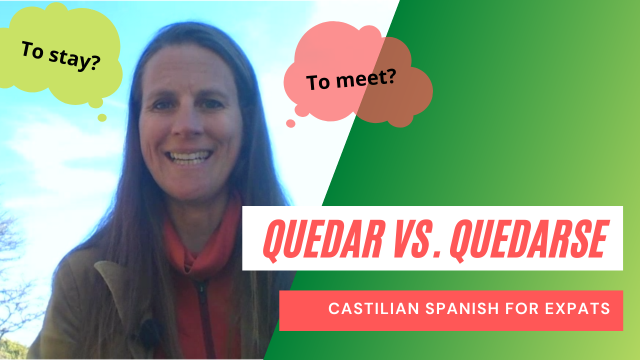Quedar(se) : one of the most frequently used verbs in Spanish
The most common meanings are “to stay somewhere” (QUEDARSE en algún sitio) and “to arrange to meet someone” (QUEDAR CON alguien).
But both forms of the verb can also have other meanings depending on the context where they are used.
So I’ve decided to create a quick video with examples of how this verb is used in Spanish.
You will be able to read along as you listen to the examples.
Below the video you will also find all the texts of the video, plus you will be able to download the dialogue with its full translation in English as well as detailed explanations of the different ways “quedar” and “quedarse” are used.
I hope you enjoy this video, and please feel free to post your comments at the end!
Video
————————————————-
Texts from the video
————————————————-
1. Simple form (QUEDAR)
A. To arrange to meet
Quedamos en el bar de Paco a las 8?
(Shall we meet at Paco’s bar at 8?)
B. To come to an agreement
1st example:
He quedado con mi madre para el almuerzo.
(I’m meeting my mum for lunch /
I’m having lunch with my mum.)
2nd example:
– Te parece si almorzamos juntos mañana ?
– Me parece perfecto!!
– Quedamos en eso entonces !
– How about having lunch together tomorrow?
– Sounds great!
– Deal! / Ok, let’s do that then! /
C. To remain/be left
- ¿Queda algo de la cena?
(is there any dinner left?)
– - Solo quedan 2 entradas para el concierto.
(There are only 2 tickets left for the concert.)
D. To be located
1st example:
¿Por dónde queda Correos? = ¿Dónde está Correos?
(Where’sthe post office?).
2nd example:
El museo queda a unos kilómetros de aquí.
= El museo está a unos kilómetros de aquí.
(The museum’s a few kilometres from here).
E. To suit
Te queda muy bien el vestido.
(- The dress suits you very well.)
Bueno yo creo que me queda un poco corto.
(- Well, I think it is a bit too short for me.)
===============
2. Pronominal form (QUEDARSE)
A. To stay (remain)
- Hoy llueve: me quedo en casa.
(Today it is raining, I’m staying at home.)
– - Mi mujer se quedó en la cama porque le duele la cabeza.
(My wife stayed in bed because she has a headache.)
B.To stay (lodge)
En verano nos quedamos en un apartamento cerca de la playa.
(In summer we stay in a flat near the beach.)
C.To keep/take
- Quédese con la vuelta.
(Keep the change).
– - Me quedo con estos zapatos.
(I’lltaketheseshoes).
D.To run out of
Me he quedado sin dinero
(I’ve run out of money).
===============
Short dialogue between 3 friends
This is a short dialogue between three friends, that contains the verb in all its forms/meanings explained in the first two parts of the video.
¡Hola! ¿Qué hacéis por aquí?
¡Hola! Pues yo he ido a mi clase de francés.
Y yo acabo de salir del peluquero.
Ah, es verdad, ¡te queda muy bien tu nuevo corte de pelo!
¡Gracias! Oye, ¿qué hacéis esta noche?
Yo me quedo en casa, estoy cansada.
Pues a mí me apetece salir… no me queda nada en el frigo y no me da tiempo ir de compras.
Yo también pensaba cenar fuera. ¿Quedamos en algún restaurante cerca de la playa?
No sé, es que la playa queda lejos de donde vivo.
Si quieres te quedas a dormir en mi casa esta noche, así no te tienes que preocupar por la vuelta.
Vale, perfecto, ¿a qué hora quedamos entonces?
¿Sobre las ocho y media?
¡Para mí está bien!
Ok, ¡quedamos en eso!
How well did you understand this dialogue?
I’ve prepared a full transcript of the video for you to download, with the ENGLISH TRANSLATION of the dialogue in the form of an easy-to-read “Spanish / English” table. All you need to do is insert your email below, and you will receive it immediately in your inbox!

